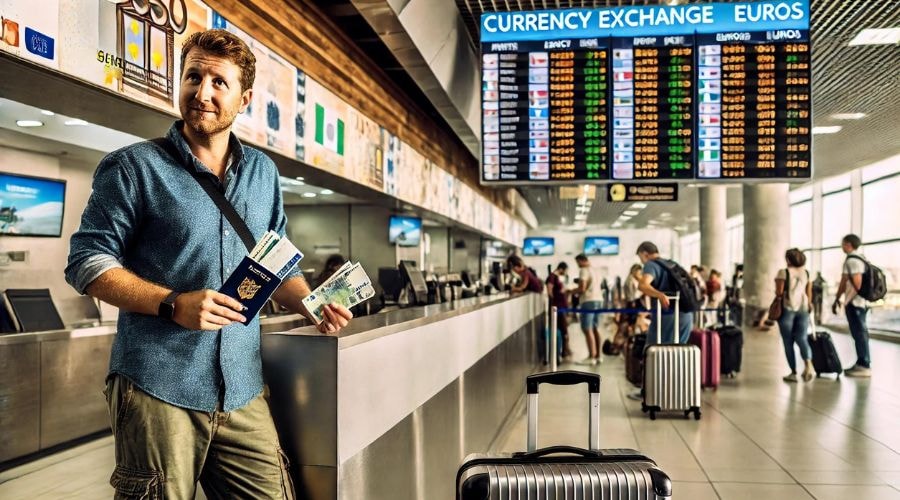
You should bring around €200 to €300 in cash when traveling to Ireland. Ireland is a predominantly cashless society, but having some cash on hand is useful for smaller purchases, tipping, and places that might not accept cards, such as rural areas, private rooms, or local markets. Most of your expenses, like dining, shopping, and transportation, can be easily handled with credit or debit cards. However, it’s always good to have cash available for convenience and emergencies.
During my last visit to Ireland, I comfortably managed with about €100 daily. This budget easily covered casual dining, transportation, and small gifts. Smaller towns especially appreciated cash payments. It’s always wise to keep a little extra for spontaneous outings.
How Much Money Should You Take To Ireland for a Week?
You should take approximately 700 to 1,000 euros for a week in Ireland. This estimate covers daily expenses like meals, transportation, and entrance fees to attractions. Dining out averages 15 to 25 euros per meal, and local transport may cost about 10 euros daily in the city centre. Consider extra funds for shopping or unexpected expenses.
Always have some cash on hand, but remember that credit cards are widely accepted in major cities, hotels, and tourist spots—watch out for foreign transaction fees. This budget allows for both essential spending and a few luxuries to enhance your travel experience. If you plan to visit more remote areas or participate in tours, it’s wise to allocate additional funds to cover those activities and any unforeseen costs, such as medical emergencies or fluctuations in the exchange rate.
Moreover, if your travel plans include Northern Ireland, ensure you are covered with adequate travel insurance and aware of any cash disclosure declaration requirements if you receive cash amounts that could raise reasonable grounds for inquiries into criminal conduct. For your financial safety, avoid carrying large amounts of pound sterling in cash, relying instead on safer options like ATM withdrawals, money orders, or promissory notes. This cautious approach will help you manage any risks and enjoy your trip without undue worry.
How Much Money to Bring for Two Weeks in Ireland?
For a two-week trip to Ireland, you should plan to bring approximately €1500 to €2000 per person. This budget considers moderate spending habits and covers your daily expenses like meals, transportation, and occasional splurges on entertainment. Adjusting this amount might be necessary depending on your travel style, choice of accommodations, and dining preferences. While many establishments accept credit cards, having cash on hand for smaller venues and tips is always practical.
-
Accommodation: If you haven't paid for your accommodations in advance, budget around €100 per night for a mid-range hotel. For a two-week stay, this would amount to approximately €1400.
-
Dining: Expect to spend about €15 for a casual lunch and up to €50 for a dinner at a more upscale restaurant. A safe daily budget for meals would be around €40, which includes both dining out and occasional snacks.
-
Transportation: Daily transportation costs, whether you're renting a car or using public transit, could average around €20. If you plan on visiting multiple regions, setting aside up to €300 for transportation over two weeks will cover most of your needs.
-
Sightseeing and Entertainment: Average entry fees for museums, historical sites, and guided tours are about €15 per visit. You might also want to attend special events or experiences, which can cost more.
While credit cards are widely accepted in Ireland, it's advisable to carry a reserve of approximately €200 in cash, or the equivalent of a few gold nuggets, to manage any unforeseen expenses or emergencies. This fund can cover anything from unexpected transportation costs to personal needs that may arise during your journey. This approach ensures you enjoy your Irish adventure with peace of mind, knowing all potential expenses are covered.
Should You Get Euros Before Going to Ireland?
Yes, obtaining euros before traveling to Ireland is recommended. Having local currency on hand upon arrival provides immediate convenience and security. This pre-emptive step ensures you're prepared for any immediate costs such as transportation from the airport, tipping services, or even your first meal.
It saves the trouble of searching for an exchange bureau right after a potentially long flight, especially in less tourist-centric vacation locations where ATMs and exchange services might not be as readily available.
You need to consider these points when obtaining Euros:
-
Exchange Rates: It's often more cost-effective to exchange money through your local bank or a currency exchange service before you leave. Airports and tourist spots typically have higher fees and less favorable exchange rates.
-
Convenience: Carrying euros means you're ready to pay for services where credit cards aren't widely accepted, such as local markets or rural bed and breakfasts.
-
Safety: Managing currency exchange from the comfort of your home avoids the need to carry large amounts of cash in unfamiliar surroundings, reducing the risk of theft.
-
Budgeting: Having a set amount of euros can help you stick to a budget by limiting spontaneous purchases or overspending while you're abroad. It's easier to track your spending when using physical currency, ensuring you stay within your financial plan for the trip.
Conclusively, securing euros beforehand not only facilitates a smoother start to your trip but also helps in better budgeting your travel expenses. This proactive approach allows you to enjoy your initial experiences in Ireland without the additional stress of financial logistics.
What Are the Daily Costs in Ireland?
The daily costs in Ireland primarily consist of expenses for food and drink, transportation, and attractions. Food and drink can vary significantly based on your choice of dining. A meal at an inexpensive restaurant costs around €15, while a three-course meal at a mid-range restaurant may set you back about €55. Daily transportation costs depend on your mode of travel; a one-day bus pass generally costs about €10. Admission fees for major attractions also vary, ranging from €5 to €30, covering everything from historical sites to museums and parks. This initial estimation will help you budget accordingly as we delve deeper into each category.
Food and Drink
The daily costs in Ireland for food and drink can vary significantly based on your dining choices. In general, expect to spend around €15 for a budget meal at a modest restaurant. For a three-course meal at a mid-range restaurant, prices typically range from €55 to €65 per person.
-
Coffee: Around €3 to €4 for a regular cup.
-
Pint of beer: Typically costs €5 to €7, with prices higher in city centers and tourist areas.
-
Fast food: A combo meal is about €8 to €10.
Supermarket prices are reasonable if you plan to cook or prepare your meals. Basic groceries for a week can cost between €20 to €50, depending on your dietary habits and preferences. Be sure to have enough cash on hand to cover these expenses, especially in establishments that do not accept credit cards.
Transportation
Transportation costs in Ireland vary based on your travel style and the cities you visit. In urban areas like Dublin or Cork, public transportation is readily available and relatively inexpensive. Here are some typical costs:
-
Bus and Tram: A single journey on a city bus or tram costs approximately €2 to €3.50.
-
Taxis: Starting fare for taxis is usually around €4, with an additional €1.10 to €1.45 per kilometer.
-
Train: Inter-city train fares depend on distance but expect to pay between €15 and €40 for longer trips.
For those renting a car, daily car rental, rates start at around €40. However, remember to account for fuel costs, which are higher than in many other countries, averaging about €1.50 per liter.
Attractions
Attractions in Ireland cover a wide spectrum from historical sites to natural wonders, influencing daily travel expenses significantly. Entry fees for a tour of major attractions like the Guinness Storehouse or Cliffs of Moher typically range from €15 to €30. Dublin's museums, many of which offer free admission, present an exception, helping to balance overall costs.
Key attractions and their average costs include:
-
Kilmainham Gaol: Around €10, offering a deep dive into Ireland's political history.
-
Dublin Zoo: Costs about €20, ideal for family outings.
-
Ring of Kerry: Free access, though guided tours add to expenses.
Consider purchasing a tourist pass if planning multiple site visits. The Dublin Pass, for example this instance, starts at €70 and covers entry to over 30 attractions, potentially offering substantial savings.
How Much Cash Can You Bring Through Dublin Airport?
When traveling through Dublin Airport, you can bring unlimited amounts of cash, but any sum exceeding €10,000 must be declared to a customs officer. This regulation aims to prevent money laundering and ensure financial transparency. Here are the key points to consider:
-
Declaration Requirement: Any amount over €10,000, or its equivalent in other currencies, requires a declaration. This includes the sum of cash, checks, and bonds.
-
Declaration Process: Fill out a declaration form available at customs. Provide details about the source and intended use of the funds.
Always consider safety and convenience when carrying large sums of cash, and explore other options for spending money like travel cards or electronic transfers for additional security.
What Should You Do if You Run Out of Cash in Ireland?
If you run out of cash in Ireland, immediately locate the nearest ATM to withdraw more funds using your own debit card or credit card. Most towns and cities across Ireland are equipped with ATMs that accept international cards, ensuring you can access additional money when needed.
-
Contact your bank: If you encounter issues with your card, contact your bank's customer service for assistance.
-
Use digital payments: Many establishments in Ireland accept digital and card payments, reducing the need for cash.
-
Seek help at tourist centers: Tourist information centers can provide guidance on local financial services and emergency assistance if needed.
Always keep a digital copy of your bank and emergency contact numbers accessible in case your wallet is lost or stolen. This proactive step ensures you can act quickly to secure your finances and continue enjoying your trip without significant disruptions.
FAQs On How Much Cash to Bring to Ireland?
1. How much cash should I bring to Ireland?
You should bring around €100-€150 per day to cover meals, transportation, and small purchases. For larger expenses or accommodations, use credit cards or electronic payments for safety and convenience.
2. Is it better to exchange currency before arriving in Ireland or in Ireland?
Exchange a small amount before arriving in the country of Ireland for initial expenses. For better rates, exchange the bulk of your currency at local banks or post offices in Ireland.
3. Can I use credit cards everywhere in Ireland?
Most establishments in Ireland accept credit cards. However, it’s wise to carry some cash for small shops or rural areas where electronic payments might not be available.
4. Are ATMs widely available in Ireland?
ATMs are widely available in cities and towns throughout Ireland. You can withdraw cash as needed, which may help in managing your travel budget more effectively.
5. What should I do if I run out of cash in Ireland?
If you run out of cash, you can withdraw more from ATMs. Additionally, most places accept credit cards, which can be a convenient alternative to carrying large amounts of cash.
